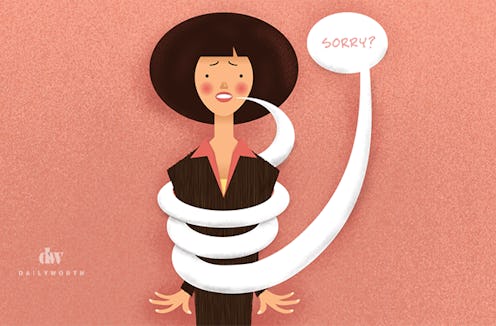Life
Why I'm Done With Saying "I'm Sorry"

By Kara Andersen
I have a confession: I wasn’t actually sorry for most of the things I’ve said I’m sorry for.
(Sorry.)
My natural instinct is to go with the flow, keep my head down, and keep the peace. I’m very good at empathy, at making others feel welcome and comfortable, and I love this about myself. But I don’t love that sometimes I apologize when I should be standing my ground, or that I disadvantage myself and other women by defaulting to a passive role — the unassertive female stereotype — in order to salvage an agreement, a truce.
A lot of those “I’m sorry, but...” utterances are almost automatic, as if I’ve conditioned myself to apologize on autopilot. Do I really mean to express regret every time I use the words “I’m sorry?”
I don’t think so.
My apology is often an acknowledgement of guilt for being the person who delivers an inconvenient message, who doesn’t have the right answer, or who has to provide an answer that suddenly makes the situation uncomfortable.
I want to become more aware of how I use the words “I’m sorry” in everyday conversation, think critically about when they’re actually appropriate, and work to use them deliberately and with authority.
Here are some times I’ve noticed I apologize that seem completely unnecessary:
1. Apologizing for speaking up about mistakes
At the coffee shop on the way to the office in the morning: “Sorry, this is skim. I asked for almond milk. Can I get that instead?”
In small, relatively inconsequential exchanges like ordering coffee, I find it tempting to overlook a minor mistake in order to avoid conflict, especially if I’m in a hurry. It’s usually not that big a deal, so why be picky?
Because it’s not always about getting the coffee order just right. Sometimes it’s about noticing a mistake in a project or communicating that what a colleague delivered is not what you asked for. So I’m going to stop apologizing for catching errors, especially if that error may have otherwise been overlooked.
2. Apologizing because you have a different opinion
“I’m sorry, but I disagree. I think Candidate X is more qualified than Candidate Y.”
Often, I put the words out there just to fill an uncomfortable pause in conversation or to soften the blow of an answer I know the other party doesn’t want to hear. I should own my contrasting opinions, my right to disagree, and my refusal to buckle under the pressure of an uncomfortably long pause.
I want to take time to find the right words and express myself accurately and eloquently instead. The words “I’m sorry” have no place in a simple difference in opinion.
3. Apologizing for saying "no"
“Unfortunately our budget cannot support that right now. I’m sorry.”
In a culture where a woman’s straight-up “NO” is frequently ignored outright, I should be equally blatant about my refusal to give consent — whether I’m turning down sexual advances or an employee’s pet project.
It’s just as reasonable to say “no” as it is to say “yes,” and I shouldn’t apologize every time I need to use the negative.
4. Using apology to turn someone down with grace and dignity
“I’m sorry, but your performance just hasn’t been what we need it to be. We’re going to have to address this.”
Nuanced, diplomatic language in conversations involving sensitive subject matter is necessary. Sometimes an apology is appropriate in these instances, but it can be a fine line. This is when it’s crucial to consider the weight and meaning of words: Is an apology owed? Or is it serving as a way to soften your authority and disapproval?
5. Using an apology to announce my presence
“I’m sorry, do you have a minute?”
I’m here! Deal with it.
Illustration by Heather Bradley.
This article originally appeared at DailyWorth. Copyright 2015. Follow DailyWorth on Twitter and Facebook.
You Might Also Like:Ditch the Uptalk — How to Make Your Voice PowerfulWhy I’m Done Being a ‘Nice Girl’A Step-by-Step Guide to Salary Negotiation